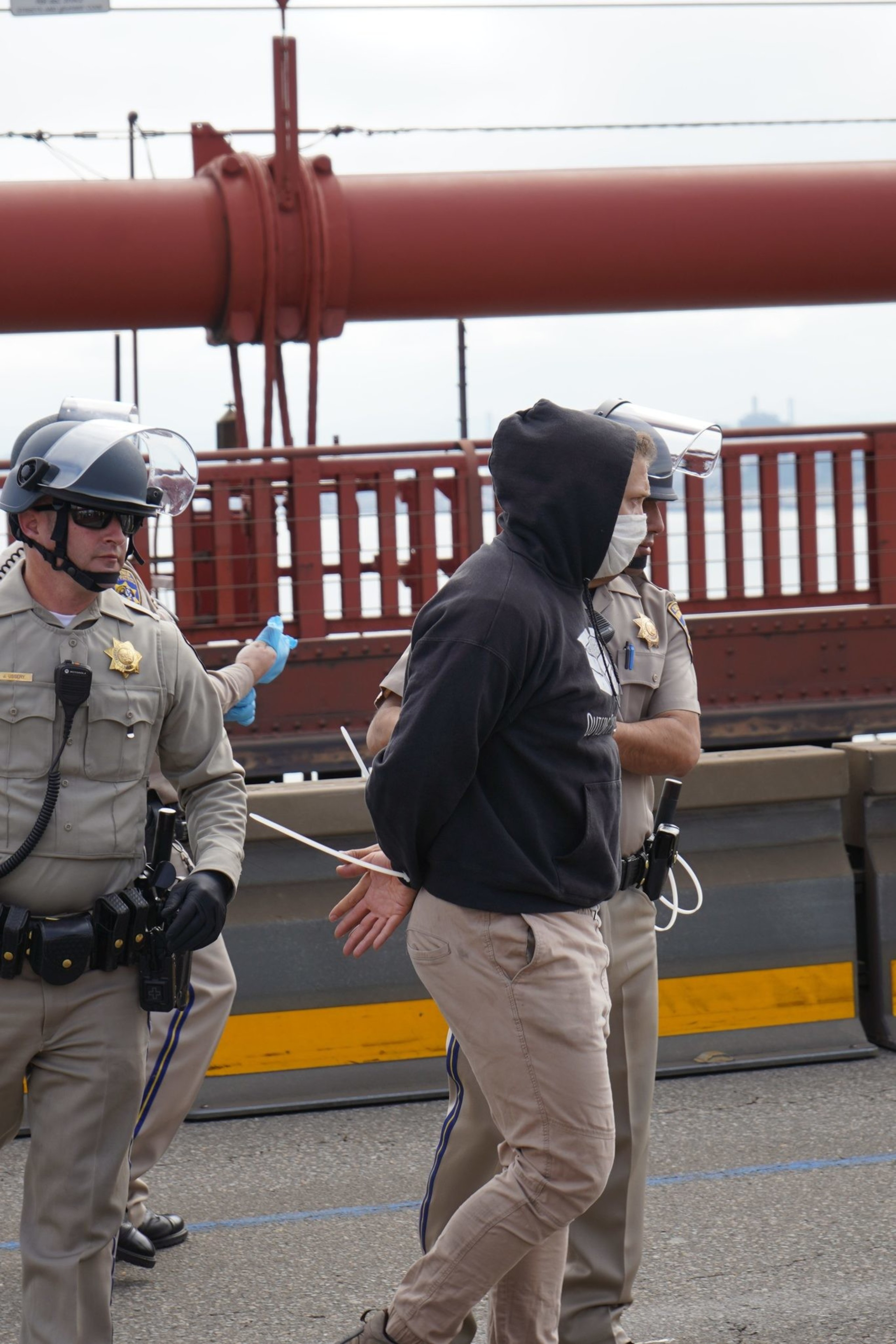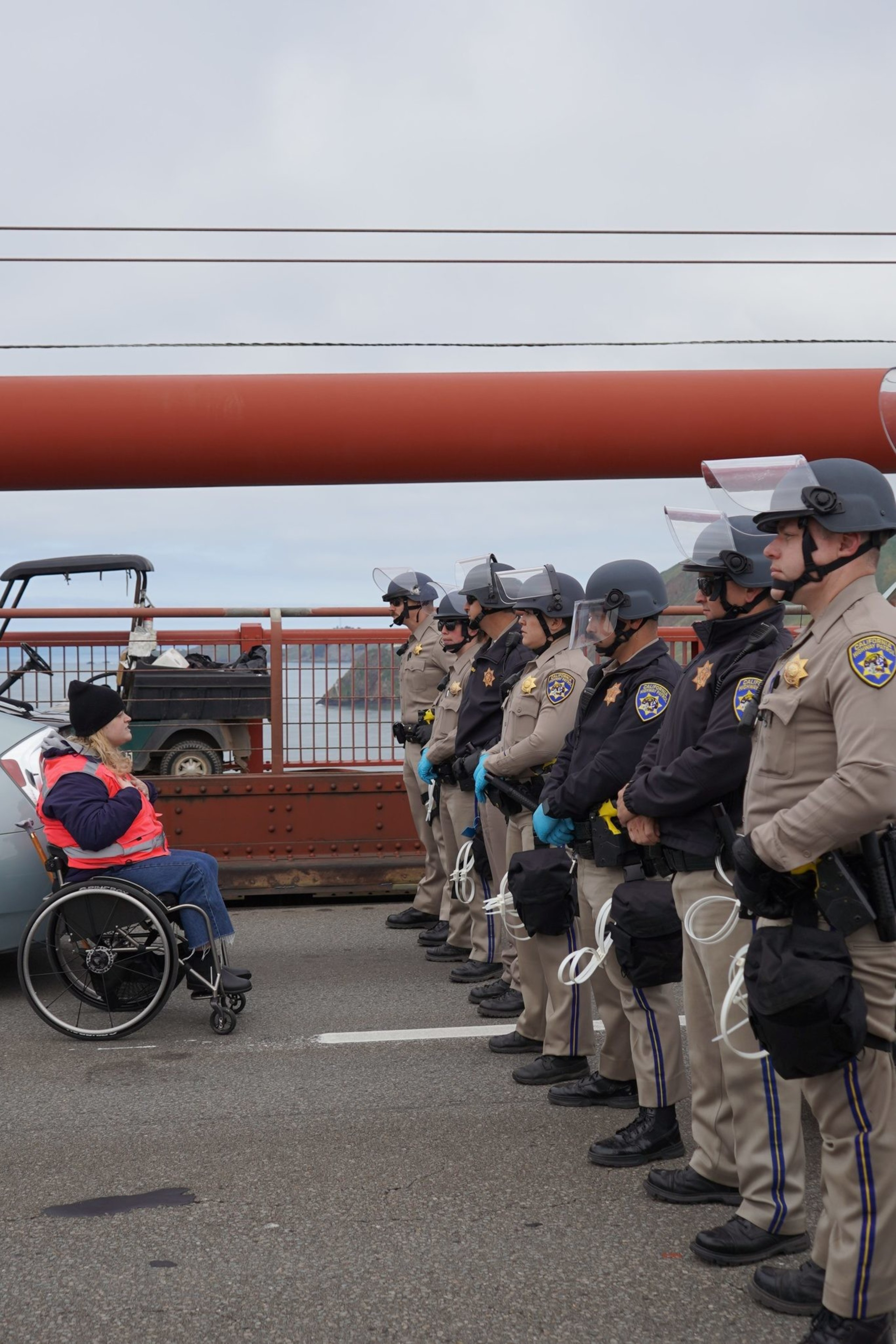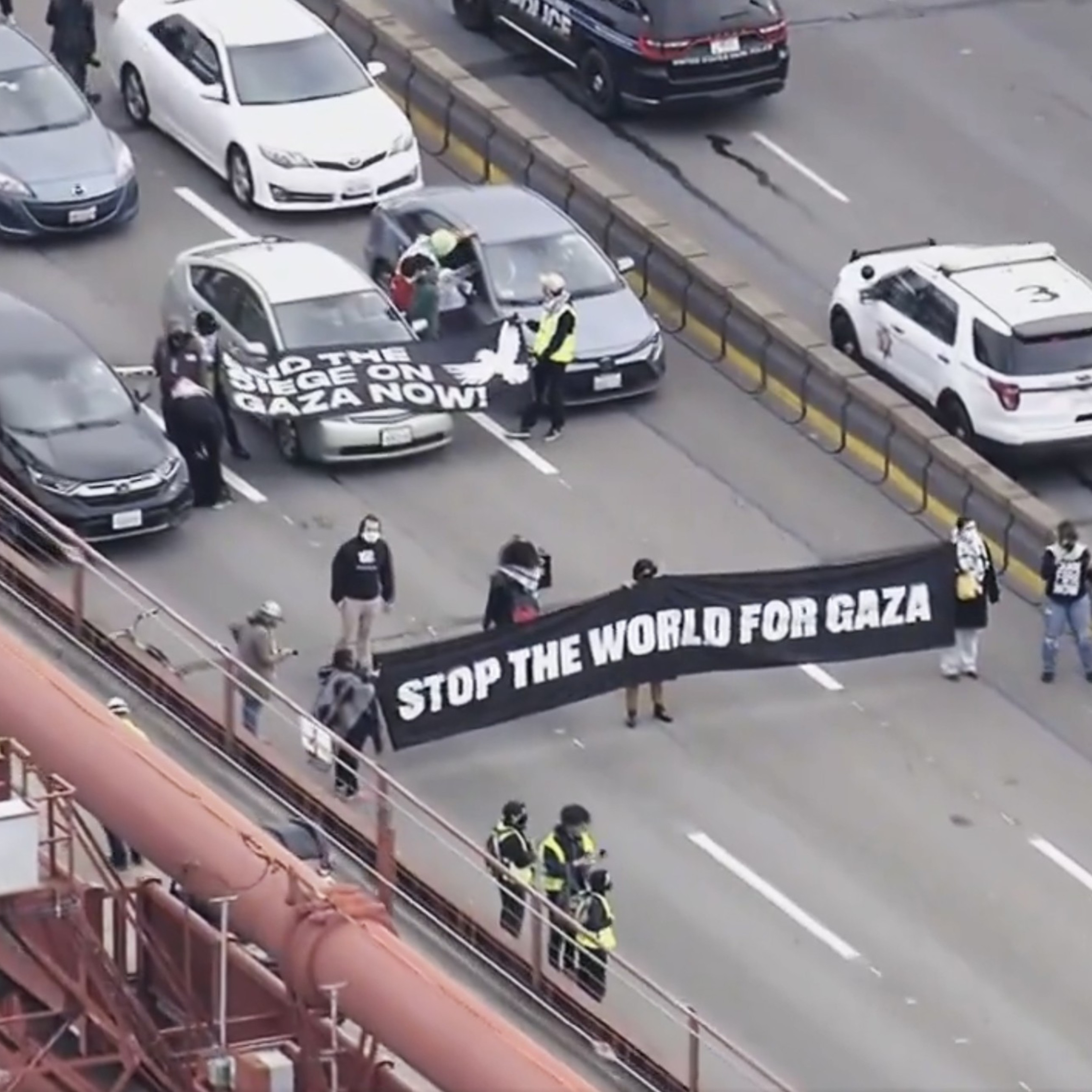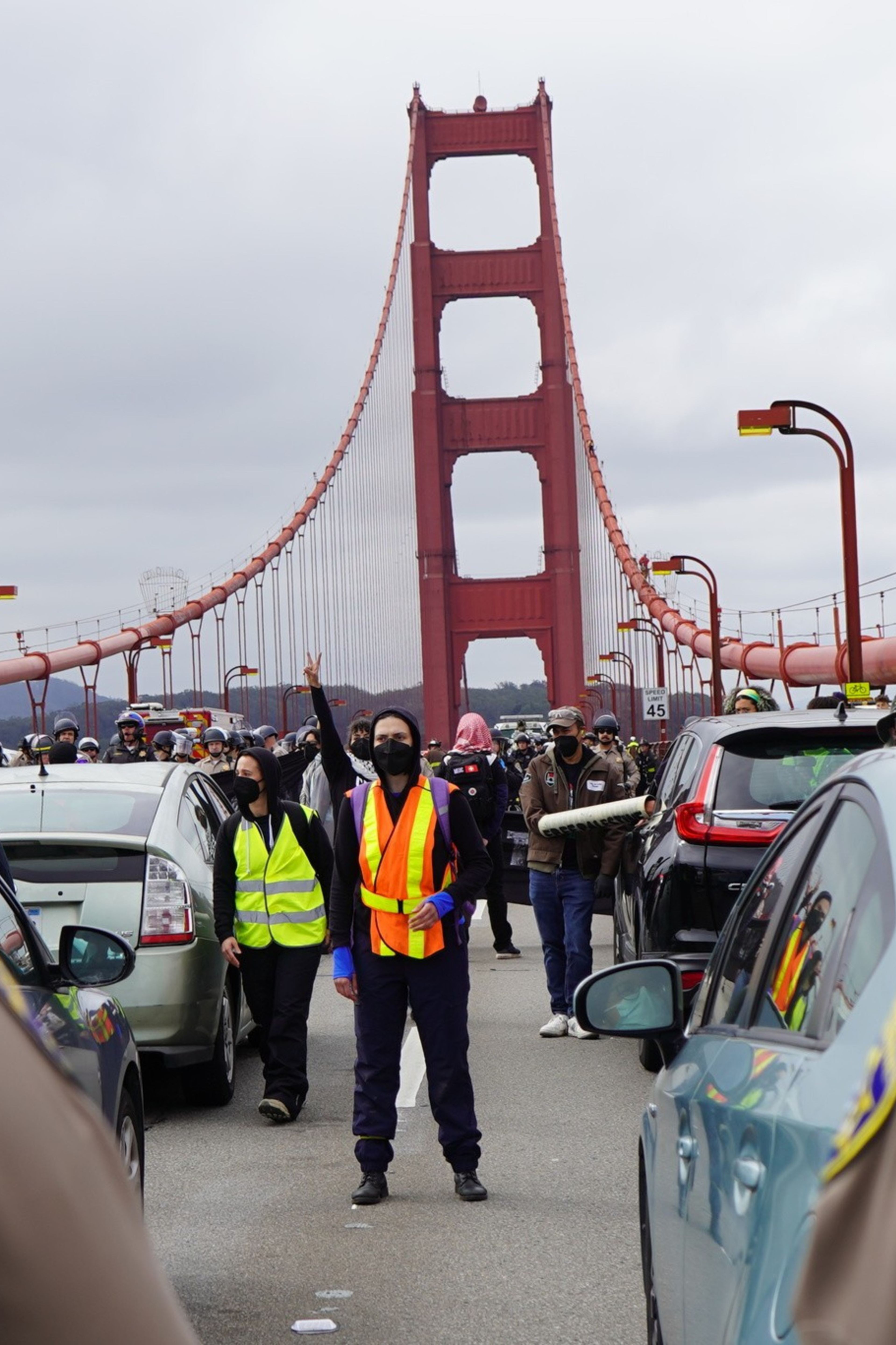San Francisco is criminally prosecuting activists who blocked traffic on the Golden Gate Bridge last spring to protest Israel’s invasion of Gaza.
The San Francisco district attorney’s office announced the charges against 26 protesters early Saturday, saying the April 15 demonstration went beyond an exercise of free speech and endangered members of the public.
Eight of the protesters stand accused of a count each of felony conspiracy, trespassing, obstructing a thoroughfare, refusal to disperse a riot and failure to obey a lawful police order, and 38 counts of false imprisonment.
Eighteen others stand accused of misdemeanor versions of the same charges.
“While we must protect avenues for free speech, the exercise of free speech cannot compromise public safety,” DA Brooke Jenkins said in a prepared statement. “The demonstration on the Golden Gate Bridge caused a level of safety risk, including extreme threats to the health and welfare of those trapped, that we as a society cannot ignore or allow.”
The case hinges on the argument that protesters essentially held people hostage in the course of their demonstration, which involved posting up in a row of cars and chaining their arms together through metal tubes called “sleeping dragons” so that only first responders could undo them.

When the 26 were arrested in the days after the protest, civil liberties advocates decried the law enforcement response as heavy-handed — and took issue with the way Jenkins went on social media to solicit testimony from potential victims.
The National Lawyers Guild, which has been working with the protesters since their arrests four months ago, echoed some of those same concerns.
“There were many demonstrations that happened on that day in different parts of the Bay Area — and this is the only case we know of that’s being charged,” National Lawyers Guild attorney EmilyRose Johns told The Standard in a phone call Saturday. “Other DAs, [Oakland DA] Pamela Price for example, has been dignified about this issue. She’s not coming out and saying that she supports protesters, but she’s also not using the full mechanisms of the state to silence them.”
San Francisco had to drop charges against 78 anti-war protesters who blocked the Bay Bridge last fall because they couldn’t point to any victims. It seems Jenkins was determined to not make the same mistake twice.
“It feels like it’s a lot about her ego,” Johns said.
And the way the DA announced these charges feels a lot like an intimidation tactic, Johns added. The protesters apparently only learned about the charges by reading articles about it and have yet to see any corroborative documentation from law enforcement.
That the news came out on the eve of a weekend is frustrating, too, Johns continued, because that means the accused have to wait at least another two days to do anything about it.
“The DA could have shared with us that there were charges and arranged with us the dates for them to come to court to face those charges,” she said. “They could have issued summonses to court. There was no reason they had to go to this degree to issue these warrants. Nobody is running. Nobody is hiding. Nobody’s evading arrest. All of their choices around issuing the warrants and issuing this late on a Friday night, all seem to maximize the state oppression.”


After Jenkins solicited tips on social media, the CHP led the investigation by talking to witnesses about how the mid-April protest more than just inconvenienced them.
In the affidavit summarizing that investigation, prosecutors describe how the blockade kicked off just before 8 a.m. on April 15 on the bridge’s midspan. Golden Gate Highway and Bridge Transportation District Capt. Roger Eularia quickly deemed the protest an unlawful assembly and ordered the group to disperse or face arrest.
Protesters ignored the commands, per the affidavit. A woman with a neon-pink safety vest emblazoned with the words “Police Liaison” — later identified as Sara Cantor — told Eularia that the drivers were chained together and that “the Fire Department would need to cut them free.”
Cantor said the protesters wouldn’t talk to law enforcement, according to the DA, and asked all communication to go through her. Conversations with her proved unfruitful, according to law enforcement — even after she was told protesters would be liable for any injuries that resulted from the incident.


At the forefront of the traffic blockage were three cars, each with a person inside with arms outstretched through the window through a metal tube that linked them to protesters standing outside the vehicles, prosecutors say.
CHP showed up at 10:17 a.m. and took over talks with Cantor, according to the affidavit. Officers reiterated that the protest was illegal and had to decamp. Cantor relayed that information to two people — later identified as Rosa Frecia Villaroel and Nicholas David Gott — who were standing under a large banner.
When she came back, authorities say, she told the CHP that the protesters would refuse to comply.
Some 12,000 vehicles use the bridge between 8 a.m. and noon, while 8,000 drive through the northbound lanes of U.S. 101 in the same time frame, according to transit officials. Because the protest blocked all lanes, the Golden Gate Bridge District said it lost more than $162,000 in revenue that day.
The affidavit describes how CHP spoke to more than 200 people who were negatively affected by the demonstration. The CHP identified 35 who said they missed work, important medical appointments or flights.
The affidavit cites one woman who missed a pre-op appointment for brain surgery to remove a tumor in her temporal lobe. Another woman told investigators she ran out of water for infant formula and missed a pre-surgery doctor visit for her baby.
One woman cited in the affidavit said her disabled child was stuck on a school bus for hours on the bridge. A surgeon told authorities she had to reschedule a procedure planned for that day. And at least two people said they had to relieve themselves in their cars because they were trapped.
“The California Highway Patrol recognizes and supports everyone’s First Amendment right to protest and assemble, but that right does not extend to blocking roadways and preventing the free movement of others,” CHP Chief Don Goodbrand said in the DA’s press release. “Regardless of the message, blocking roadways is not only illegal, but also dangerous for protesters, motorists, and first responders who must now assist in clearing the incident.”
Whatever disruptions resulted from the protest, Johns said the aim was to demand a ceasefire and call attention to the mounting death toll in Gaza.
When protesters blocked traffic in April, some 30,000 Palestinians had been killed since the Hamas attacks on Oct. 7 that claimed hundreds of Israeli lives. Four months later, the body count (opens in new tab) cited by the Gaza Ministry of Health is closer to 40,000, with another 92,000 Palestinians wounded.
“People are outraged and the politicians are not listening,” Johns said. So, she added, “grievances around our community’s civil disobedience are understandable, but they have to be juxtaposed to what is being decried.”
Jeff Wozniak, another lawyer who’s been working with the protesters, said the message his clients were trying to amplify has grown all the more urgent in the time since the bridge shutdown as the U.S. continues to enable Israel’s military incursion.
“Instead of supporting a ceasefire in Gaza, Jenkins has filed felony charges and over 40 misdemeanors on each of the 26 people charged,” Wozniak said in an email to The Standard. “This is an incredible waste of resources for a non-violent political action.”
The defendants have until Monday to turn themselves in for booking; court appearances will be scheduled as they surrender.

